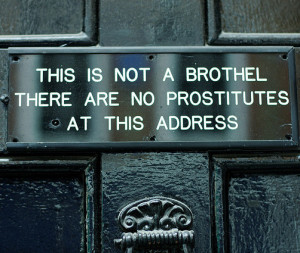 In recent years, Maine prostitution defense attorneys have seen a major increase in prostitution enforcement. In 2013, Maine’s legislature created two new crimes: sex trafficking and aggravated sex trafficking. Aggravated sex trafficking is a serious felony crime charged agains those who promote prostitution in Maine by “compelling” a person to engage in prostitution. Compulsion is defined very broadly so that a wide range of defendants can be charged with the crime. A new law now uses that same definition to create a defense for those charged with engaging in prostitution.
In recent years, Maine prostitution defense attorneys have seen a major increase in prostitution enforcement. In 2013, Maine’s legislature created two new crimes: sex trafficking and aggravated sex trafficking. Aggravated sex trafficking is a serious felony crime charged agains those who promote prostitution in Maine by “compelling” a person to engage in prostitution. Compulsion is defined very broadly so that a wide range of defendants can be charged with the crime. A new law now uses that same definition to create a defense for those charged with engaging in prostitution.
A new defense to prostitution in Maine
On 4/10/14, Governor LePage signed LD 1730 “An Act To Assist Victims of Human Trafficking.” It creates a new defense to the crime of engaging in prostitution in Maine, a violation of 17-A §853-A, by adding the following language to that section:
It is an affirmative defense to prosecution under this section that the person engaged in prostitution because the person was compelled to do so as described in section 852, subsection 2.
The new defense requires the defendant to show that they were compelled as defined in Maine’s aggravated sex trafficking statute, 17-A §852(2). Under that law, compelling can mean any of the following:
- The use of a drug or intoxicating substance to render a person incapable of controlling that person’s conduct or appreciating its nature;
- Withholding or threatening to withhold a scheduled drug or alcohol from a drug or alcohol-dependent person. A “drug or alcohol-dependent person” is one who is using scheduled drugs or alcohol and who is in a state of psychic or physical dependence or both, arising from the use of the drug or alcohol on a continuing basis;
- Making material false statements, misstatements or omissions;
- Withholding, destroying or confiscating an actual or purported passport or other immigration document or other actual or purported government identification document with the intent to impair a person’s freedom of movement;
- Requiring prostitution to be performed to retire, repay or service an actual or purported debt; and
- Using force or engaging in any scheme, plan or pattern to instill in a person a fear that, if the person does not engage or continue to engage in prostitution, the actor or another person will:
- Cause physical injury or death to a person;
- Cause damage to property, other than property of the actor;
- Engage in other conduct constituting a Class A, B or C crime or criminal restraint;
- Accuse some person of a crime or cause criminal charges or deportation proceedings to be instituted against some person;
- Expose a secret or publicize an asserted fact, regardless of veracity, tending to subject some person, except the actor, to hatred, contempt or ridicule;
- Testify or provide information or withhold testimony or information regarding another person’s legal claim or defense;
- Use a position as a public servant to perform some act related to that person’s official duties or fail or refuse to perform an official duty in a manner that adversely affects some other person; or
- Perform any other act that would not in itself materially benefit the actor but that is calculated to harm the person being compelled with respect to that person’s health, safety or immigration status.
In Maine, an affirmative defense places the initial burden on the defendant to prove certain facts are more likely than not to be true. If the defense makes that initial showing, the prosecution must disprove the defense beyond all reasonable doubt; if hey can’t do that, the defendant is not guilty.
Compensation for sex trafficking victims
The new law adds victims of sex trafficking and aggravated sex trafficking to the list of people eligible for payment from the state’s victim compensation fund. That’s a pool of money funded by a surcharge added to every criminal conviction in Maine. If more money is going to be paid out, more needs to come in and the new law drastically increases the surcharges assessed against some prostitution defendants.
Huge fees added to some Maine prostitution charges
Though victim compensation fees are normally $35 for felonies and $20 for misdemeanors, the new bill will drastically increase those fees for some prostitution offenses. The following fees are added on top of any fines assessed by the court:
- $1,000 for aggravated sex trafficking
- $500 for sex trafficking
- $500 for the first conviction and $1,000 for each subsequent conviction of engaging in prostitution
- $500 for the first conviction and $1,000 for each subsequent conviction of patronizing prostitution of a minor or patronizing prostitution of a mentally disabled person
Interestingly, there is no increased victim compensation fund fee for engaging a prostitute, that’s the crime charged for those caught paying a prostitute for sex. Prostitutes end up charged with engaging in prostitution, and they must pay the increased fees. Of course, they’re the same people who are now eligible to collect compensation from the fund.
Practical impact
Effectively, this law makes it hard for prosecutors to charge the crime of engaging in prostitution. With such a board definition of “compelled” almost every prostitute will have a defense to prostitution in Maine. Conduct as simple as lying to someone can count as compulsion.
The law should be understood as part of a shift in law enforcement’s focus. Though previous cases rounded up prostitutes to get them off the streets, these new laws give them a defense while making the organizers liable for felony crimes and serious prison time.
Image from Jon Cockley via flickr. Cropped.





